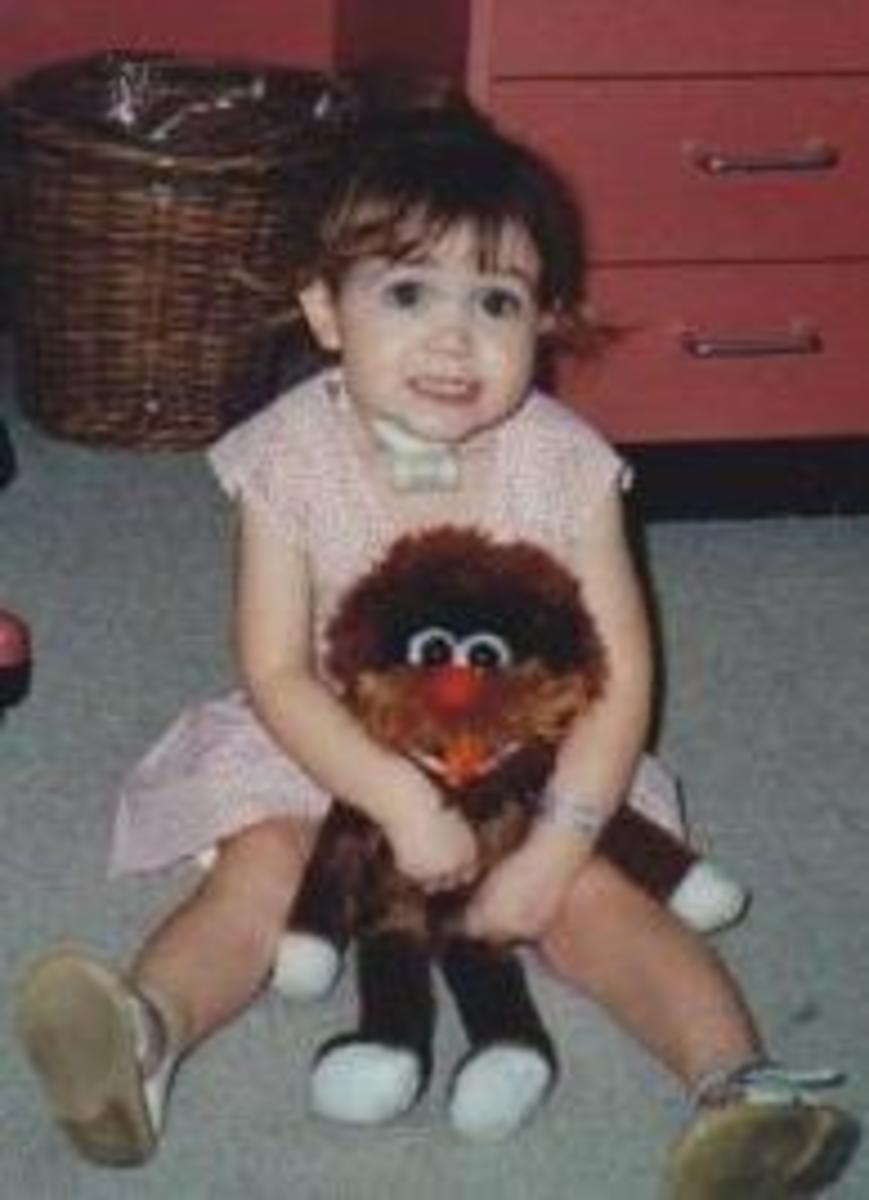Understanding Bipolar Disorder
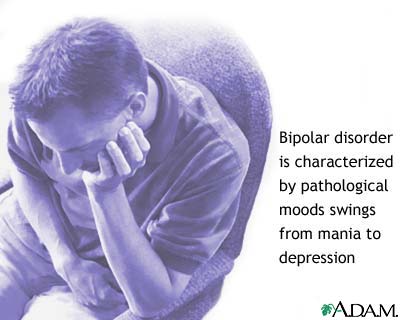
History of Bipolar Disorder
Bipolar is a common misunderstood psychological illness. It was once termed as Manic Depressive Disorder. It is also one of the oldest known psychological disorders and dating back as early as the second century. The writings dating back to this era went unnoticed until Richard Burton wrote The Anatomy of Melancholia. It was written specifically about depression and his findings are used still today by professionals in the psychology field. Some call him The Father of Depression In 1854 Jules Falret found a link between depression and suicide.The work done by Falret led to term it bipolar and mark a distinction between manic episodes and depression. In 1875 it was called Manic Depressive Psychosis as a result of his findings. His work also found links to a genetic component as he found it in families.
Francois Baillarger thought that there was a difference between episodes of bipolar and that of schizophrenia.
There was an article The Journal of Nervous and Mental Disorder in 1952 that analyzed the genetic component.
Congress refused to recognize this disorder in the 60's and people were put into psychological institutions and not helped much financially. There were laws put in place a decade later and in 1979 NAMI was founded. In 1980 they re-named the disorder as Bipolar.
Do you suffer from Bipolar Disorder?
Popular Media News Regarding Bipolar
- Silver Linings Playbook bipolar disorder interview with Dr Linda Papadopoulos - hellomagazine.com
Interview with psychologist Dr Linda Papadopoulos about Silver Linings Playbook, bipolar disorder and other mental illness
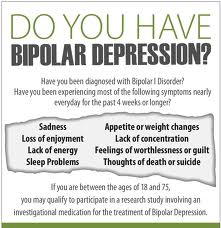
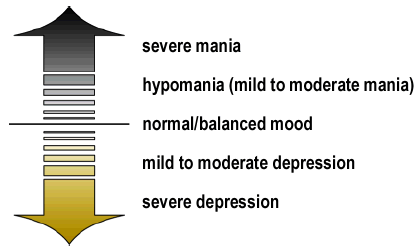
What is Bipolar?
Bipolar is a disorder marked by severe moods; mania, hypomania, and depression. A person can switch quickly, sometimes termed as "rapid cycling." The age of onset ranges from 15-years-old to 25-years-old. It affects both men and women. The cause for this disorder isn't currently known. It is theorized that there is a genetic component as it is frequently seen in families that have another relative with Bipolar.
There are two major types of Bipolar and a milder third form called cyclothymia. Bipolar Type 1 is characterized by at least one manic episode and periods of major depression. Bipolar Type 2 has never had a full blown manic episode. They experience periods of accelerated energy and are impulsive; called hypomania. Hypomania alternates with depression. Cyclothymia has less severe mood swings and alternates between hypomania and mild depression.
Some events that seem to correlate with manic episodes are childbirth, taking an antidepressant medication, sleeplessness, and recreational drug use.
Mania can last days to months and someone who is symptomatic may distract easily, sleeps very little, has poor judgement, poor temper control, and has some reckless behavior. From an outsiders perspective it is identifiable through:
- binge eating, drinking, drug use
- promiscuity
- shopping in excess
- hyperactivity
- high energy
- talking a lot
- false beliefs due to high self-esteem
- gets very upset or aggitated
A depressive phase is marked by:
- sadness
- inability to concentrate
- memory issues
- indecisiveness
- hopelessness
- guilty feelings
- no pleasure in normal activities
- lowered self-esteem
- sleeping too little or too much
There is a high risk of suicide and symptoms of suicide are worse if using illegal drugs or alcohol.
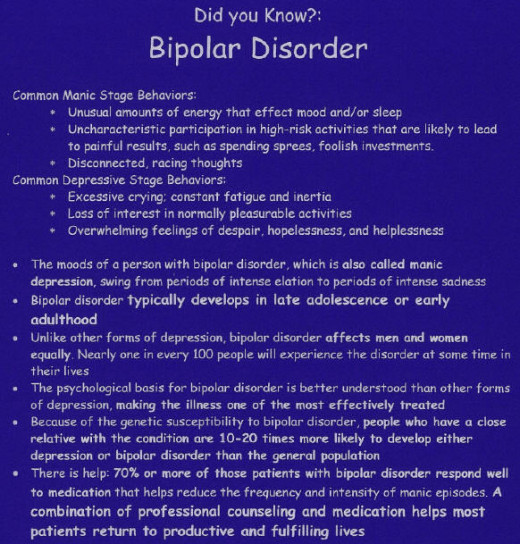
Myths of Bipolar Disorder
There is unfortunately a stigma related to this disorder and many misconceptions surround the symptoms and treatments.
- Myth 1: The individual causes the disorder
- This is false, it is caused by interwoven genetic, biological, and environmental factors. - Myth 2: They could will themselves out of the mood swings
- It is beyond their control and can actually ruin their life when left untreated. To treat this disorder and control the mood swings they need medications and therapy. - Myth 3: Bipolar people will never be normal
- If the person can make minor changes to accommodate their illness, they can live out their goals and dreams just like everyone else. - Myth 4: Bipolar is easy to diagnose
- Actually it is very difficult to diagnose. Some people have been diagnosed as Bipolar who is actually suffering from ADHD and vice verse. It is hard to transfer the individual's experience to the listed symptoms in the DSM-IV - Myth 5: Treatment is actually worse than the disorder
-Actually medication is key and only a minor inconvenience.
Sharing the News
It is common for the diagnosis of Bipolar to be denied by the person that suffers from the disorder. Due to the stigma and misconceptions, people are uncertain and even afraid to share the news with people in their lives, afraid of the reaction. There is some unknown in regards to who to tell of the diagnosis and who will make the ideal support system that will be needed throughout treatment.
It is advised to be selective in who is told of the diagnosis but, it shouldn't feel like a deep dark secret. Awareness is important and its important to understand that reactions will vary widely as people may not understand what it really means. Many people have a good experience when finally disclosing their condition to others and they no longer feel alone in dealing with getting better. Being straightforward is the best but be prepared to give helpful information and avoid false beliefs of disorder in those that are told.
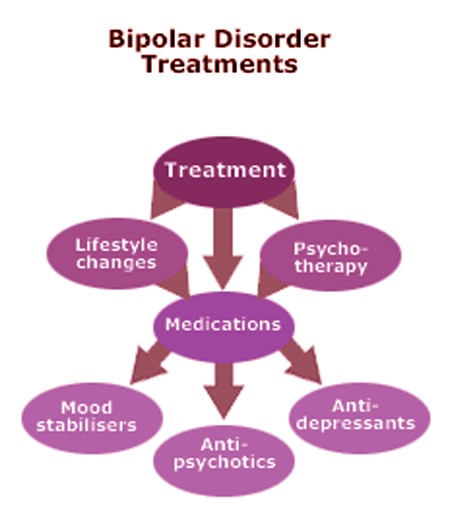
Treatment of Bipolar Disorder
It is ideal to have a treatment team that includes a therapist and psychiatrist (at least) that can share vital information as they have different perspectives. The treatment should be seen as a collaborative process.
There are two different types of psychotherapy that are effective in managing bipolar:
- Cognitive Behavioral Therapy - This is a research proven method and is comprised of five different components.
- Educating patients and their family about symptoms and managing the disorder.
- Creating an early warning system that detects symptoms before they escalate.
- Teaches strategies to control negative emotions and destructive behavioral patterns.
- Helps stick with treatment and consistently taking medications.
- Manages stress and teaches better ways at solving problems effectively without triggering an episode.
2. Interpersonal and Social Rhythm Therapy (IPSRT)
- Includes interpersonal psychology and social rhythm that regulates routines and maintains them.
Treatment contracts are a part of CBT. It selects a support system of several people who will be supportive and help the person through their treatment. The support system will be educated about bipolar. Its goal is to prevent depression by teaching everyone to detect the warning signs and being able to manage it. Details are given about sleep, mood, and behavior changes when episodes occur. The patient agrees to reach out to the support system for immediate help if feeling suicidal. In addition to preventing depression its goal is to also prevent mania.
Medication distributed is often a mood stabilizer and an anti-psychotic (helps with sleep) or an antidepressant if the depression is debilitating. 20-30% of people will develop mood instability when taking an antidepressant.
This content is accurate and true to the best of the author’s knowledge and does not substitute for diagnosis, prognosis, treatment, prescription, and/or dietary advice from a licensed health professional. Drugs, supplements, and natural remedies may have dangerous side effects. If pregnant or nursing, consult with a qualified provider on an individual basis. Seek immediate help if you are experiencing a medical emergency.
© 2012 Abby Rourk








